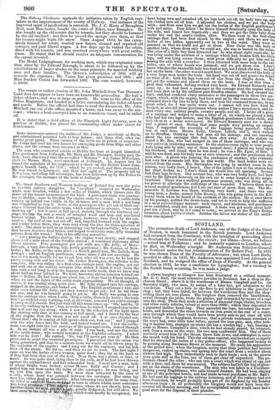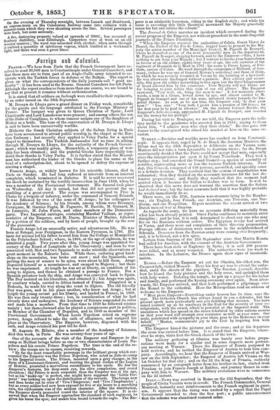SCOTLAND.
The premature death of Lord Anderson, one of the Judges of the Court of Session, is much lamented in the Scotch journals. .Lord Anderson had returned from the Continent, with the intention of proceeding direct to Scotland for the business of the circuit ; but illness—fever, we believe —seized him at Folkstone ; and he instantly repaired to London, where he died, on Wednesday aennight. Mr. Anderson was Solicitor-General for Scotland under the last Administration of Sir Robert Peel. In 1851 he was chosen Dean of the Faculty of Advocates; but when Lord Derby acceded to office in 1852, Mr. Anderson was appointed Lord Advocate of Scotland, and he resigned the office of Dean of Faculty. At the general election in 1852, he was a candidate for Lymington ; but a vacancy in the Scotch bench occurring, he was made a judge.
A clever burglary at Glasgow has been frustrated at a critical moment. Mr. D. C. Bait., the most extensive jeweller in Scotland, has a shop in Bu- chanan Street ; above it is the warehouse of Messrs. Campbell and Co. On Saturday night, two men, by. means of a false key, got admission to the warehouse. They cut a hole m the floor to get admission to the jeweller's shop ; but they were foiled, for between the warehouse-floor and the shop- ceiling there are iron plates. The burglars then removed the hearthstone, sawed through the joists, broke the plaster, and descended by means of a rope into the shop. There they made a selection of diamond rings, chains, brooches, and other costly articles, valued at more than 2000/., which they deposited in a japanned leather hand-bag. They ascended the rope, traversed the ware- house, and descended the stairs towards an iron grate at the end of a Court, once through which they would have been pretty safe to get clear off with their booty. It so happened, however, that a private watchman attached to the court had, some little time before, opened the iron gate, and, after lock- ing it behind him, stumped up-stairs (he has a wooden leg) ; but, hearing a noise at Messrs. Campbell's door, which he had already passed, he returned, and, from a recess on the stair, the two men confronted him. One of them instantly seized him by the throat, threw him down, and attempted to cover his mouth with his hand. This the old man resisted, and bawled out so lustily that he attracted the notice of a day police-officer, who happened luckily to be passing along Buchanan Street at the moment. He made his appearance at the grated door; when the burglars, seeing that their position had become dangerous, rushed up-stairs, and sprang into the court from a window about sixteen feet high. They immediately took to their heels ; and, as the streets were quite still at the time, one of them got clear off unpursued. The po- liceman chased the other ; who ran into a court which was closed at one end with a door, and there he was secured. The robbers had left the bag of plun- der on the stairs of the warehouse. The man who WAS taken is a truculent- looking young Englishman, who calls himself Jackson. He had been staying at one of the principal hotels, and had made several purchases at Mr. Bait's. He had sent his luggage to the railway terminus, and if the robbery had not been frustrated, he would probably have got off for England by the Sunday afternoon train • in all probability the burglary would not have been dis- covered till Monday morning, and the accomplialzedartita would have had a good start for the.21iIposar of their plunder. On the evening of Thursday sennight, between Lanark and Braidwood, in express-train on the Caledonian Railway came into collision with a mineral-train which they were shunting across the line. Several passengers were hurt, but none seriously.
A fire, destroying Property valued at upwards of 2000L, has occurred at Sunbury distillery, near Edinburgh. Carpenters were at work on an old wooden receiver ; the wood was saturated with alcohol; when sawn through it emitted a quantity of spirituous vapour, which kindled at a workman's light, and there was soon a great blaze.



























 Previous page
Previous page